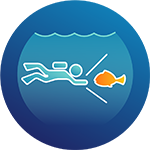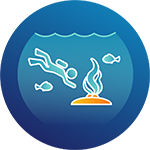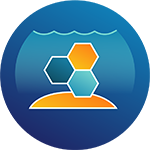
Oceanography
Studying Our Greatest Resource
Because the ocean covers over 70 percent of the planet and contains 99 percent of the living space on Earth, its composition (e.g., its physical, chemical, and biological makeup) has a significant impact on all life. This is true whether that life is in or out of the water. Oceanography is the study of that composition, the role the ocean plays in Earth’s ecosystems, and the ways in which the ocean impacts life on Earth (and vice versa). Oceanography covers a wide range of topics, including marine ecosystems, plate tectonics, ocean circulation, seabed geology, and the chemical and physical properties of the ocean. It is a vitally important field of study as climate change and pollution are threatening the ocean, rising sea levels are eroding coastlines and entire species of marine life are at risk of extinction.
The Four Branches of Oceanography
Oceanography is typically divided into the following four sub-disciplines: chemical oceanography, physical oceanography, geological oceanography, and biological oceanography (each of which has its own dedicated snapshot page elsewhere on the Ocean Connect website). These sub-disciplines are interrelated and closely aligned to other ocean-related fields such as ocean engineering, atmospheric science, and marine microbiology.
Chemical Oceanography
Chemical oceanography is considered a niche area within the broader field of oceanography. It is said that chemical oceanographers work at the “boundaries between chemistry and biology, geology and physics” and “apply their efforts to a broad spectrum of interdisciplinary challenges.” [1] That is because the chemistry of the ocean is closely tied to ocean circulation and climate (physical oceanography), the plants and animals that live in the ocean (biological oceanography), and the exchange of material with the atmosphere, cryosphere, continents, and mantle (geological oceanography).[2] Chemical oceanographers are essentially oceanographers, but rather than studying the physics, biology, or geology of the oceans as a broad subject; they examine the chemical composition of this particular environment.
Physical Oceanography
Physical oceanography involves studying the properties (such as temperature and density) and movement (such as waves, currents, and tides) of ocean water.[3] It also involves studying the interaction between the ocean and the Earth’s atmosphere, how the ocean stores and releases heat, and coastal dynamics.[4] Stated another way, physical oceanographers study the interaction between the ocean and its boundaries — land, seafloor, and atmosphere — and the relationship between the sea, weather, and climate.[5] Physical oceanography is divided into descriptive and dynamical physical oceanography. Descriptive physical oceanography “approaches the ocean through both observations and complex numerical model output used to describe the fluid motions as quantitatively as possible.”[6] Dynamical physical oceanography “seeks to understand the processes that govern the fluid motions in the ocean mainly through theoretical studies and process-based numerical model experiments.”[7]
Geological Oceanography
Geological oceanography is the study of the structure, creation, evolution, and history of the ocean floor. Geological oceanography is one of the broadest fields in the Earth Sciences and contains many subdisciplines, including geophysics and plate tectonics, petrology and sedimentation processes, and micropaleontology and stratigraphy.[8] Geological oceanographers combine their knowledge of physical oceanography and marine chemistry to piece together information about how the Earth was formed and how the movement of plates and continents causes earthquakes and volcanoes.[9] The results of this work help us understand the processes that created the ocean basins and the interactions between the ocean and the seafloor.[10] By examining the distribution of fossils embedded in the seafloor, geological oceanographers also try to understand past changes in the Earth’s climate and the causes for those changes.[11] And in studying the past, the belief is that the information collected can then be used to predict and ultimately help lessen the impacts of future climate change.
Biological Oceanography
Biological oceanography is the study of the ocean through the lens of marine life, its distribution, abundance, environmental interaction, and predation.[12] A biological oceanographer pays particular attention to the effects of chemical, physical or geographic properties of the ocean and how these affect the distribution and abundance of marine organisms in the sea. Biological oceanography has many similarities to marine biology. However, while marine biologists study the plants, animals, and protists in the ocean, biological oceanographers study marine organisms and their biological processes within the context of their natural environment.[13]
…
Citations
- Chemical Oceanography, MIT-WHOI Joint Program.
- Chemical Oceanography, School of Oceanography, University of Washington.
- Oceanography, Texas A&M University.
- Physical Ocean, NASA Science, Share the Science.
- A Sea Grant Guide to Ocean Opportunities.
- Descriptive Physical Oceanography: An Introduction, Talley, Lynne D. (2011).
- Descriptive Physical Oceanography: An Introduction, Talley, Lynne D. (2011).
- Oceanography, Geological, Water Encyclopedia.
- OceanOpportunities, Woods Hole Oceanographic Institute.
- What does an oceanographer do? National Ocean Service, NOAA.
- OceanOpportunities, Woods Hole Oceanographic Institute.
- Oceanography and Marine Biology (Are They Same or Different), Earth Eclipse.
- Oceanography, Marine Careers, NH Sea Grant.

The Path to Becoming an Oceanographer
From High School to Your First Job
Build a Solid Academic Foundation
Basics:
Take all available STEM-related courses (chemistry, biology, physics, computer science, algebra, geometry, calculus) offered at your high school. Take all these classes at the most advanced level possible (honors, AP). This will help you build your knowledge base in scientific theory and concepts.
Recommended:
If not available at your high school, take ocean science-related (oceanography, marine biology, marine microbiology, coastal science), chemistry-related (inorganic chemistry, biochemistry, geochemistry), and physic-related (biophysics, thermodynamics, acoustics, geophysics) classes offered online.
Keep in Mind:
Gain lab work experience through a research internship. Learn how to write for a scientific and non-scientific audience. The ability to communicate in writing cannot be overstated. Given the international nature of scientific collaboration, become fluent in a foreign language. Be a voracious reader.
Dive In!
And become an expert
![]()
Peruse our library of must-read books
![]()
Thumb through a scientific publication
Take an online course
![]()
Watch an interesting video
![]()
Check out these great websites
Get a

jump on your Academic career
There’s no substitute for experience.
We have compiled a database of thousands of internships, research opportunities, academic programs and specialized training programs so you can get a jump on your academic career.
Internships
Research
Academic Training Programs
And if you need support to fulfill your dreams and ambitions, our searchable database has plenty of scholarship opportunities as well as programs designed to increase diversity in the sciences.
Scholarships
Diversity, Equity & Inclusion
Need Help Finding Your Opportunity?
Our video tutorials explain the ins and outs of landing a great internship, research project or training program.
Make all the right moves
Advice from those who know
Maintain an excellent GPA, especially in the sciences
Attend professional conferences and oceanography seminars
Present your research at student research colloquiums
Build experience through internships or as an undergraduate researcher
Have some work experience on your resume
Obtain lab experience and become familiar with lab instrumentation
Join professional societies and organizations
Stay current by reading professional and scientific journals
Learn about current research projects
What degree is right for you?

Bachelor’s Degree
A bachelor’s degree is required for all entry-level jobs, but your advancement will be limited. You should obtain a degree in oceanography or something either closely related (marine biology, marine microbiology, coastal science) or complementary (biogeochemistry, atmospheric sciences). Familiarity with lab techniques, computer modeling, and the use of scientific instrumentation is essential.
Master’s Degree
A master’s degree is highly recommended as this is where, depending on the program, you will be able to begin to specialize your studies in oceanography. A master’s degree will open up more opportunities with both federal and state government agencies as well as with various companies in the private sector. In a master’s program you will learn the theory and the practice of oceanography in addition to having the opportunity to engage in fieldwork.
Doctorate
A doctoral degree is required if you want to have a career in academia. Senior research positions with federal and state government agencies (conducting research on the effect of various pollutants on the marine environment, establishing policy on climate change) and senior project manager positions with private consulting firms (assessing the quality of fish and fish products, pollution control) may require a doctoral degree. This is also true for high-level positions with nongovernmental and nonprofit organizations.
10 Schools With Excellent Oceanography Programs
Want to see the full list of colleges and universities with degree offerings or relevant courses?
Ocean Science
Skidaway Institute of Oceanography, University of Georgia
Oceanography
Hawaii Pacific University
Oceanography
Rosenstiel School of Marine and Atmospheric Science, University of Miami
Oceanic and Atmospheric Sciences
Scripps Institution of Oceanography, UC San Diego
Oceanography
University of Washington School of Oceanography
Oceanography
University of Delaware
Oceanography
Cal Poly Humboldt
Oceanography
Texas A&M University
Oceanography
Florida Institute of Technology
Ocean Sciences
Oregon State University
![]()
Tip 1
Given the interdisciplinary nature of oceanography, you can still pursue a career in the field even if your school does not have a specific oceanography major. You can major in marine biology, chemistry, physics or geology.
![]()
Tip 2
Don’t just consider a school’s undergraduate offerings. Even if a school does not offer an oceanography major at the undergraduate level, you may eventually be able to take classes in oceanography at the graduate level.
![]()
Tip 3
As soon as possible, get out in the field to gain some real-world experience and perspective. There are lots of internships and research opportunities available to students interested in the ocean sciences.
Have familiarity with one or more of the following areas

Field survey and analytical techniques

Marine remote sensing

Underwater photography and imagery

Scientific diving

Navigation

Robotics

Geophysical survey

Oceanographic sampling

Marine Geographic Information Systems

Laboratory testing technique
Typical Job Functions of an Oceanographer
Here are some of the interesting things you could be doing.
Planning and carrying out research expeditions.
Spending time at sea collecting samples and data from the sea floor using specialized equipment and techniques.
Studying the ocean’s currents, waves, tides, and other flow patterns.
Mapping the distribution, ranges, or movements of marine populations.
Managing teams of scientists during data collection and analysis of information.
Performing simulations of ocean phenomena using computer or mathematical models.
Analyzing the health of various components of the marine environment.
Teaching oceanographic concepts and scientific knowledge in educational institutions.
Using computer modeling to make predictions about the marine ecosystem.
Investigating the risks to coastlines from storms and tidal waves.
There’s an Ocean of Possibilities
Oceanography is a wide-ranging field that can involve climate change, pollution, mineral exploitation, shipping, fisheries, coastal construction, weather prediction, and renewable energy. Your role as an oceanographer will be to understand and predict how the ocean works, as well as to work out how to make the most efficient and sustainable use of its resources. The interdisciplinary nature of oceanography will also allow you to satisfy your other ocean science-related interests. Just be forewarned that adjusting to long periods away at sea in conditions that may be hazardous and physically demanding can be quite challenging.
Common employers include:
Federal Government Agencies
- U.S. Environmental Protection Agency
- National Oceanic and Atmospheric Administration
- U.S. Geological Survey
- Natural Resources Conservation Service
- Bureau of Ocean Energy Management
Military
- U.S. Navy
- National Defense Research Establishments
- Centers for Disease Control and Prevention
- National Institutes of Health
- National Science Foundation
State Government Agencies
- Environmental Protection
- Fish and Wildlife
Private Industry
- Pharmaceuticals
- Emerging Technology
- Environmental Consulting
- Marine Transportation
- Offshore Renewable Energy
- Private Laboratories
Non-Governmental Organizations
- Environmental Organizations
- Conservation Organizations
Academia
- Universities
- Research Institutions
Start your career search with our extensive list of employment websites.
